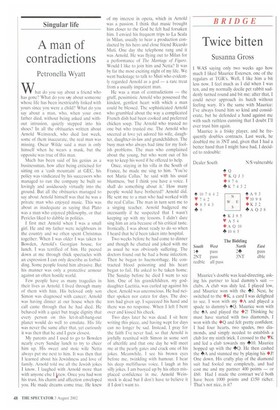Singular life
A man of contradictions
Petronella Wyatt
What do you say about a friend who has gone? What do you smy about someone whose life has been inextricably linked with yours since you were a child? What do you say about a man, who, when your own father died, without being asked and without intrusion, quietly stepped into his shoes? In all the obituaries written about Arnold Weinstock, who died last week, some of them inaccurate, the real man was missing. Oscar Wilde said a man is only himself when he wears a mask, but the opposite was true of this man.
Much has been said of his genius as a businessman, how after being criticised for sitting on a 'cash mountain' at GEC, his policy was vindicated by his successors who managed to run the company he built so lovingly and assiduously virtually into the ground. But all the obituaries managed to say about Arnold himself was that he was a private man who enjoyed music. This was about as inadequate as saying that Plato was a man who enjoyed philosophy, or that Pericles liked to dabble in politics.
I first met Arnold when I was a small girl. He and my father were neighbours in the country and we often spent Christmas together. When I was older I was taken to Bowden, Arnold's Georgian house, for lunch. I was terrified of him. He peered down at me through thick spectacles with an expression I can only describe as forbidding. Some people found him abrasive. But his manner was only a protective armour against an often hostile world.
Few people have as many tragedies in their lives as Arnold. I lived through many of them with him. His beloved only son Simon was diagnosed with cancer; Arnold was having dinner at our house when the call came through that he had died. He behaved with a quiet but tragic dignity that every person on this let-it-all-hang-out planet would do well to emulate. His life was never the same after that, yet curiously it was then that he and I grew closest.
My parents and I used to go to Bowden nearly every Sunday lunch to try to cheer him up. His sweet and stoic wife Netta always put me next to him. It was then that I learned about his Jewishness and love of family. Arnold told me all the Jewish jokes I know. I laughed with Arnold more than with anyone else I knew. Once you had won his trust, his charm and affection enveloped you. He made dreams come true. He knew
of my interest in opera, which in Arnold was a passion. I think that music brought him closer to the God he felt had forsaken him. I envied his frequent trips to La Scala in Milan, usually to hear a production conducted by his hero and close friend Ricardo Muti. One day the telephone rang and it was Arnold. He was flying out to Milan for a performance of The Marriage of Figaro, Would I like to join him and Netta? It was by far the most exciting night of my life. We went backstage to talk to Muti who evidently regarded Arnold as a god — a rare treat from a usually impatient man.
He was a man of contradictions — the gruff. pessimistic Arnold who possessed the kindest, gentlest heart with which a man could be blessed. The sophisticated Arnold who grumbled about the way a complicated French dish had been cooked and preferred chicken soup. The Arnold who trusted no one but who trusted me. The Arnold who sneered at love yet adored his wife, daughter, daughter-in-law and grandchildren. The busy man who always had time for my foolish problems. The man who complained about the young, but who went out of his way to keep his word if he offered to help.
Once, staying in his villa in the South of France, he made me sing to him. 'You're not Maria Callas,' he said with his usual bluntness, but I think you have a voice. I shall do something about it.' How many people would have bothered? Arnold did. He sent me to a man who had worked with the real Callas. The man in turn sent me to a singing teacher. Arnold badgered me incessantly if he suspected that I wasn't keeping up with my lessons. I didn't dare sing him an aria because of his critical taste. Ironically. I was about ready to do so when I heard that he'd been taken into hospital.
Two weeks before he had come to dinner and though he chatted and joked with me as usual he was obviously suffering. The doctors found out he had a bone infection. Then he began to haemorrhage. He contracted blood poisoning and his heart began to fail. He asked to be taken home. The Sunday before he died I went to see him. One of his grandchildren, my goddaughter Laetitia, was curled up against his chest. Arnold was unconscious. He had neither spoken nor eaten for days. The doctors had given up. I squeezed his hand and there was no response. When I left I bent over and kissed his cheek.
Two days later he was dead. I sit here writing this piece, and having wept for days can no longer be sad. Instead, I pray for the faith I've never had, so that Arnold is joyfully reunited with Simon in some sort of afterlife and that one day he will meet me at the pearly gates and crack one of his jokes. Meanwhile. I see his brown eyes before me. twinkling with humour. I hear his deep mellifluous voice. I laugh at his silly jokes. I am buoyed up by his often misplaced confidence in me. Arnold Weinstock is dead but I don't have to believe it if I don't want to.


























































 Previous page
Previous page